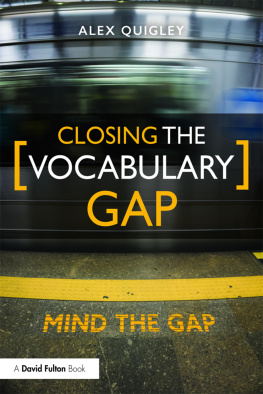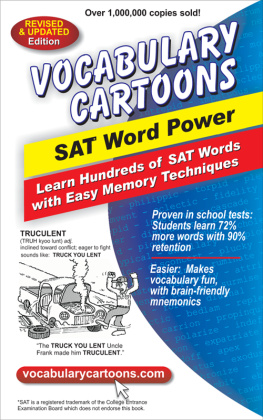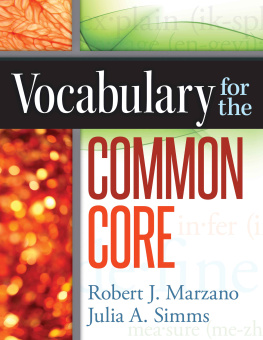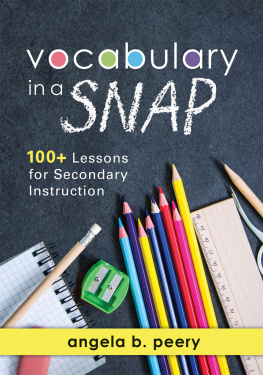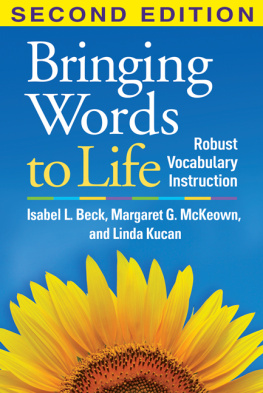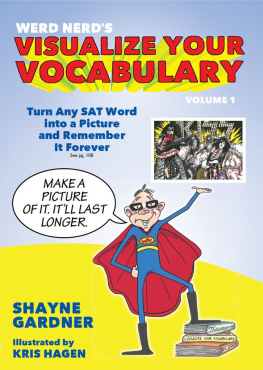In the years Ive devoted to literacy, I have learnt what I should have always have known that nothing matters more than words. Our vocabulary allows us to interpret the world, to express ourselves with greater clarity, to show confidence, insight and perceptiveness. Words lie at the heart of our quest to narrow gaps between the advantaged and disadvantaged, to address social mobility. Thats why I am so pleased to welcome Alex Quigleys powerfully illuminating book. It is a vital reminder that knowing about vocabulary is the responsibility of every teacher. It is also the entitlement of every child.
Geoff Barton, General Secretary of Association of School and College Leaders, UK
Expertly weaving academic research with observations from the classroom, Alex Quigley explains why word poverty matters and sets out what can be done about it. Word knowledge, he argues, is critical for success in every subject and as such it is the responsibility of all teachers to become word conscious. Dont grab a dictionary. Read this excellent book instead and discover an approach to vocabulary instruction that is rich, organised and cumulative and relevant for developing disciplinary knowledge across the entire curriculum.
Kate Nation, Director of ReadOxford and Professor of Experimental Psychology, University of Oxford, UK
This book offers a great overview of the research on learning vocabulary, and practical advice on how to apply this research in the classroom.
Daisy Christodoulou, Director of Education, No More Marking, UK
Closing the Vocabulary Gap
As teachers grapple with the challenge of a new, bigger and more challenging school curriculum, at every key stage and phase, success can feel beyond our reach. But what if there were 50,000 small solutions to help us bridge that gap?
In Closing the Vocabulary Gap , Alex Quigley explores the increased demands of an academic curriculum and how closing the vocabulary gap between our word poor and word rich students could prove the vital difference between school failure and success.
This must-read book presents the case for teacher-led efforts to develop students vocabulary and provides practical solutions for teachers across the curriculum, incorporating easy-to-use tools, resources and classroom activities. Grounded in the very best available evidence into reading development and vocabulary acquisition, Closing the Vocabulary Gap sets out to:
help teachers understand the vital role of vocabulary in all learning;
share what every teacher needs to know about reading (but was afraid to ask);
unveil the intriguing history of words and exactly how they work;
reveal the elusive secrets to achieve spelling success; and
provide strategies for vocabulary development for all teachers of every subject and phase.
With engaging anecdotes from the authors extensive personal teaching experience woven throughout, as well as accessible summaries of relevant research, Alex Quigley has written an invaluable resource suitable for classroom teachers across all phases, literacy leaders and senior leadership teams who wish to close the vocabulary gap.
Alex Quigley is an English Teacher and Director of Huntington Research School, York, UK. He can be found on Twitter @HuntingEnglish and blogs at www.theconfidentteacher.com.
Closing the Vocabulary Gap
Alex Quigley

First published 2018
by Routledge
2 Park Square, Milton Park, Abingdon, Oxon OX14 4RN
and by Routledge
711 Third Avenue, New York, NY 10017
Routledge is an imprint of the Taylor & Francis Group, an informa business
2018 Alex Quigley
The right of Alex Quigley to be identified as author of this work has been asserted by him in accordance with sections 77 and 78 of the Copyright, Designs and Patents Act 1988.
All rights reserved. No part of this book may be reprinted or reproduced or utilised in any form or by any electronic, mechanical, or other means, now known or hereafter invented, including photocopying and recording, or in any information storage or retrieval system, without permission in writing from the publishers.
Trademark notice : Product or corporate names may be trademarks or registered trademarks, and are used only for identification and explanation without intent to infringe.
British Library Cataloguing-in-Publication Data
A catalogue record for this book is available from the British Library
Library of Congress Cataloging-in-Publication Data
Names: Quigley, Alex, author.
Title: Closing the vocabulary gap / Alex Quigley.
Description: Abingdon, Oxon; New York, NY: Routledge, 2018. | Includes bibliographical references.
Identifiers: LCCN 2017053102 (print) | LCCN 2018005169 (ebook) | ISBN 9781315113272 (ebook) | ISBN 9781138080607 (hbk) | ISBN 9781138080683 (pbk) | ISBN 9781315113272 (ebk)
Subjects: LCSH: Vocabulary-Study and teaching. | Educational equalization.
Classification: LCC LB1574.5 (ebook) | LCC LB1574.5 .Q54 2018 (print) | DDC 372.44dc23
LC record available at https://lccn.loc.gov/2017053102
ISBN: 978-1-138-08060-7 (hbk)
ISBN: 978-1-138-08068-3 (pbk)
ISBN: 978-1-315-11327-2 (ebk)
Typeset in Celeste and Optima
by Deanta Global Publishing Services, Chennai, India
Katy, Freya and Noah,
This book is written for you.
Every word shared between us is a privilege, always.
Mum and Dad,
Thank you for giving me wealth beyond money, love beyond words.
There are many people I would like to thank for helping inform this book. I would like to thank Katy Gilbert, my unofficial editor, for tolerating my research and long writing spells, as well as giving me feedback and endless support.
I would like to thank Phil Stock, Helen Day, Robbie Coleman, Tom Martell and Geoff Barton, for giving me helpful feedback on the draft of this book, offering me expert ideas and insight. I would also like to thank Dr Arlene Holmes-Henderson for her expertise that helped shape .
There are many colleagues at Huntington School who directly or indirectly helped me with their insights into vocabulary. In particular, it has been a privilege to watch expert teachers (and students) at work, at Huntington and beyond, to help inform my writing.
Thank you to the team at Routledge for their ongoing support and skill in making this book a reality.
But words are things, and a small drop of ink,
Falling like dew, upon a thought, produces
That which makes thousands, perhaps millions, think.
Lord Byron, Don Juan , 18191824
The ways of words, of knowing and loving words, is a way to the essence of things, and to the essence of knowing.
John Donne
How many words do you know?
It can prove a startling question. Though we use words all day long when talking, and in reading and writing, we seldom pay much heed to their importance or ask such questions. We have all accumulated a vast store of vocabulary that is so integral to who we are that we barely notice it. Though we are indeed experts with words, we underestimate how many words we know.
If I said that the typical vocabulary of readers of this book would be something around 50,000 to 60,000 words, would that surprise you?
We are surrounded by a vast wealth of words and they profoundly affect our lives words we use and receive, hear and speak. From the cradle to the dinner table, the classroom to the boardroom, our wealth of words can determine our status in life. With well over a million words stuffed into the English language, we cannot know them all, but with a greater awareness of words their rich and complex meanings, uses and even abuses we can help

